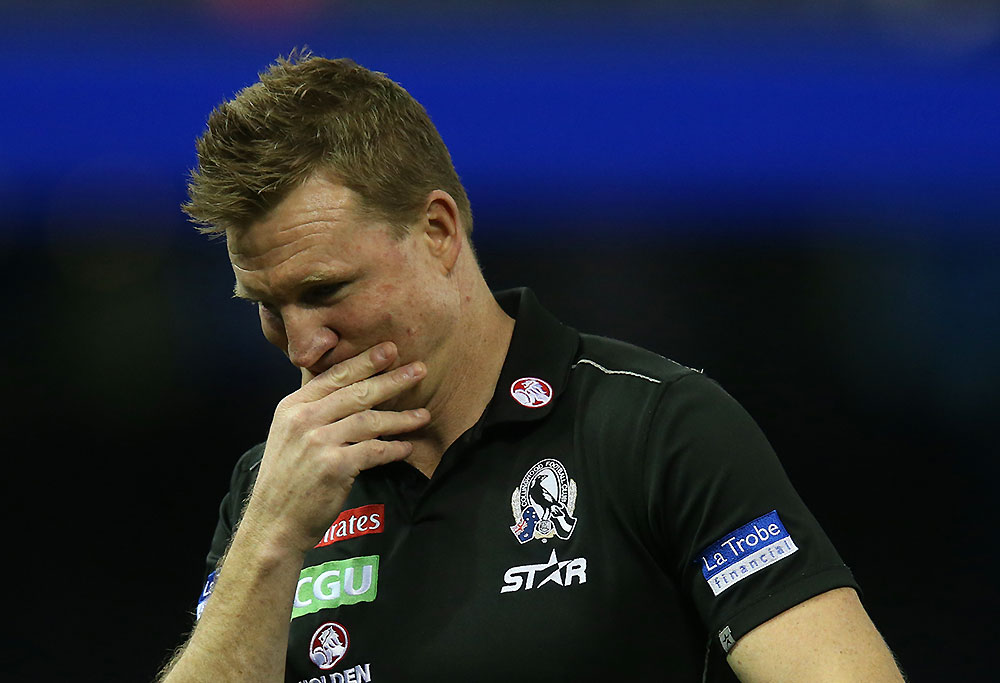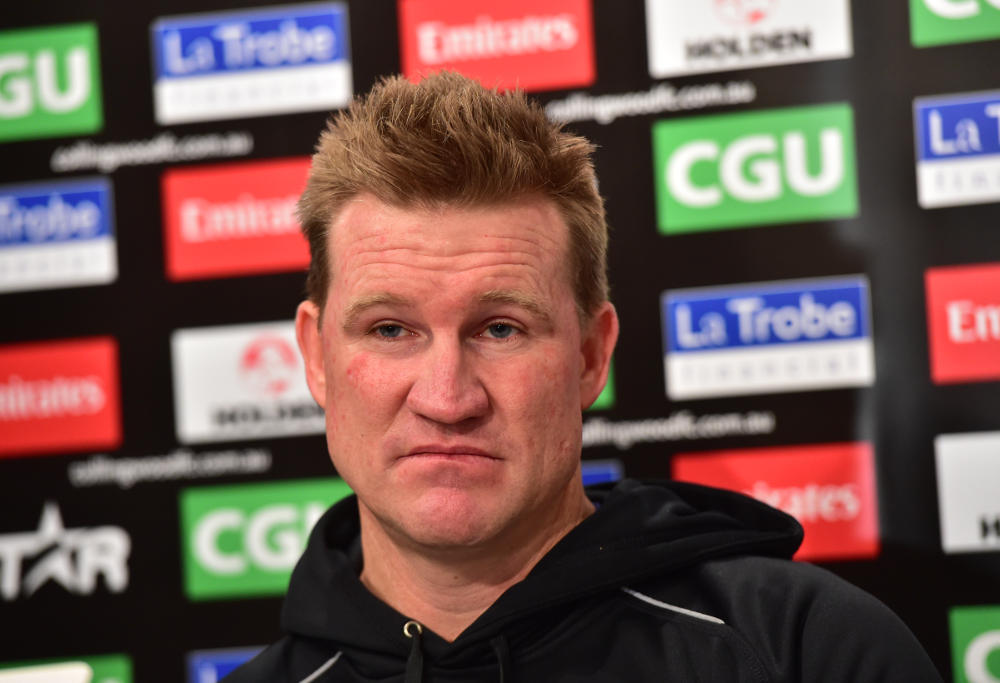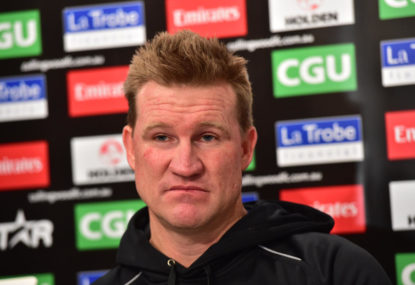Jordan De Goey’s recent suspension is a reminder that, despite Nathan Buckley’s singular devotion to Collingwood, this is a union that may well end ultimately unfulfilled.
While Buckley has undoubtedly been culpable at times, circumstances have also played their part in the Buckley and Collingwood relationship not bearing adequate fruit.
Perhaps more significant though is that Buckley’s seemingly blind faith in the Pies has informed his key career decisions which have led him to his current predicament.
Buckley’s black and white blinkers were first on display in 1993 when he selected Collingwood as his preferred destination following his solitary year with the Brisbane Bears.
Buckley commented at the time, “I’m hungry to win games and I’m hungry to play in finals.”
Quite why then he would choose a pedestrian Collingwood outfit very much on the downside of its 1990 premiership peak remains deeply puzzling.

(AAP Image/David Crosling)
Buckley would ultimately participate in only five finals campaigns in his 14 years as a Collingwood player.
Rubbing salt into the wound was the fact that Buckley would ultimately be ringside for the golden periods enjoyed by the (then) Brisbane Lions and North Melbourne, the latter long thought to be a snubbed suitor of Buckley.
That he almost single-handedly dragged a battling Pies side to the 2002 flag against the loaded (and ultimately victorious) Lions only heightened thoughts of what might have been in different colours.
There was also always that nagging feeling of coolness emanating from Buckley that meant he was never fully embraced by sections of the Collingwood faithful quite like other favourite sons.
After deciding to enter the coaching realm, Buckley once again faced a fork in the road.
Buckley could either sign up to an Eddie McGuire-orchestrated Collingwood Kirribilli agreement where he would ultimately succeed his old coach Mick Malthouse or accept the Kangaroos’ coaching job.
True to form and in spite of the inherent risks of such a handover, Buckley chose his beloved Pies.
Both the allure and the risk for Buckley, at least from the outside looking in, was a drought-breaking Collingwood premiership.
If it was to happen on Buckley’s watch, he would be addressing the one glaring gap in his storied playing career.
It didn’t, as Malthouse and Collingwood won the 2010 premiership flag against the Saints at the second time of trying.
After defeat in the 2011 decider, Buckley inherited Malthouse’s team sans mentor Malthouse who reneged on the ‘second fiddle’ part of the deal.
It’s at this point few would have blamed Buckley for enviously eyeing Brad Scott at the helm of the Kangaroos, the job Buckley passed up.
After all that position represented a relative free swing, with no one else’s premiership hangover to inherit and little expectation other than a struggling club being able to rely on its coach’s cult of personality for continued relevance.
Opinion as to Buckley’s coaching bona fides is of course divided.
A popular narrative is that Buckley somehow managed to squander the remainder of the Pies’ premiership window.

(AAP Image/Julian Smith)
Along these lines, many cite the allegedly premature forced exits of a number of premiership stars. More sinister is the notion that these moves were motivated by Buckley’s desire to construct his own team so as to move out from Malthouse’s premiership shadow.
Yet the truth is Buckley never really stood a chance. Ironically, like the Collingwood team he joined as a player, the 2012 outfit was all but spent.
Following the departures of Leon Davis and Leigh Brown, the Pies lost Andrew Krakouer and Luke Ball to early season ending knee injuries, and enjoyed roughly half a season of football from each of Alan Didak, Chris Tarrant and Ben Johnson.
From there it was a case of diminishing returns, perhaps not helped by off-field wear and tear for a team renowned for its hard-partying ways.
Of the veterans effectively cast aside, Buckley was ultimately vindicated with only Heath Shaw – who essentially forced his exit courtesy of his 2013 elimination final meltdown – providing any real sustained value for his new club GWS.
Collingwood and Buckley then set about reshaping the club’s list, and here’s where it gets a bit sticky for Buckley supporters.
Refusing to accept the club’s premiership window had closed, Collingwood under Buckley has continually sought to top up its list with veteran recruits most recently headlined by Chris Mayne and Daniel Wells.
That such an approach has worked wonders for the likes of the Swans and the Hawks does not alter the fact that the cocktail of older recycled players and failure – such has been the Collingwood experience to date – is a sure fire coach killer, particularly for one that doesn’t have a premiership medal draped around his neck.
The counter is that Buckley has endured a horrific injury run, watched mentors Rodney Eade and Neil Balme ultimately follow Malthouse out the door, and been wholly undermined by De Goey’s off-field antics.
Yet even so, that the Pies have missed the finals for four straight years suggests Buckley was extremely fortunate to receive last year’s contract extension.
That is unless Buckley’s time at Collingwood should more properly be viewed through the lens of the time honoured relationship adage, ‘you only get out what you put in’.
If so, a stay of execution is the very least Buckley deserves from a football club he has served for better or (for the most part) worse.































































































